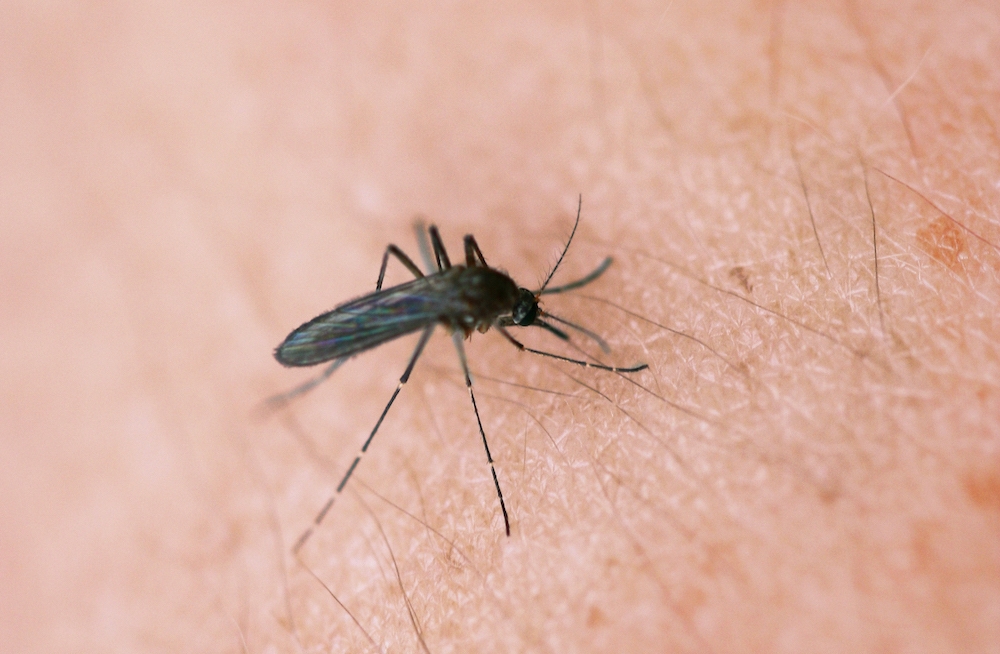 FILE PHOTO Mosquito on human skin
FILE PHOTO Mosquito on human skin
By PCE Staff
East Texas has received its fair share of spring precipitation throughout the past few weeks. In Texas that usually means the heat and everyone’s favorite insect to hate — the mosquito — are right around the corner.
For many, the mosquitoes are already here, along with millions of their friends.
So why is Commissioner Guylene Robertson parking the truck that sprays for mosquitos down Precinct 1 county roads?
As it turns out, she also isn’t too fond of the insects. Yet, through conversations with commissioners from Polk and surrounding counties, she found that they aren’t spraying either.
Health effects are the main reason, as pesticides can cause both acute and chronic problems. Acute health effects appear shortly after exposure to some pesticides and can include skin and eye irritations, headaches, dizziness and nausea, weakness, difficulty breathing, mental confusion and disorientation.
“The times have changed environmentally, and things that were considered safe in the past are no longer acceptable or recommended,” Robertson said. “At this time, motor-driven mosquito spraying is in that category.”
Precinct 1 was the only in Polk County that has sprayed for mosquitoes over the past few years. However, the City of Livingston continues to do so. Roberston said the decision not to spray was one that was difficult.
“Due to the hazards and concerns environmentally Polk County Precinct 2, 3, and 4 have not sprayed for mosquitoes for several years,” Robertson said. “This summer, Precinct 1 will now be doing the same, while observing all environmental safety aspects.”
According to the Environmental Protection Agency (EPA), several organophosphates, a class of insecticides, are highly toxic and poison insects and other animals, including birds, amphibians and mammals. Until the 21st century, they were among the most widely used insecticides available. Around 36 of them are presently registered for use in the United States, and all can potentially cause acute and subacute toxicity. Organophosphates are used in agriculture, homes, gardens and veterinary practices.
The EPA has a few suggestions in preventing mosquito bites. The first is to eliminate any standing water (even small amounts) to prevent mosquitoes from laying their eggs. If water cannot be eliminated, as in ornamental water features, use mosquito larvicide products (available at many retailers) or other pest control measures to minimize breeding opportunities. You may be able to add fish that eat larvae to a pond. Adding a fountain or aerator will keep the water and mosquitoes moving.
The agency suggests use of window and door screens to keep mosquitoes from entering your home, workplace, or children’s schools. Dress in light-colored clothing, long pants, and long sleeves. EPA-registered insect repellents will also prevent bites. Products that are EPA-registered have been confirmed to be safe and effective when label directions are followed.
There are several different homemade concoctions that can be found on the Internet. We have provided one such mix below.
HOMEMADE MOSQUITO SPRAY RECIPE
- 1 bottle of blue mint mouthwash
- 3 bottles (per 12 oz) of stale beer (take the cheapest – it works as well)
- 3 cups of Epsom salt
Pour beer and mouthwash into a container (an old saucepan, a bucket), stir and add the salt. Mix up the solution properly until salt is dissolved. Pour the mixture into a spray bottle. Shake well before use and spray areas where you spend time outside.